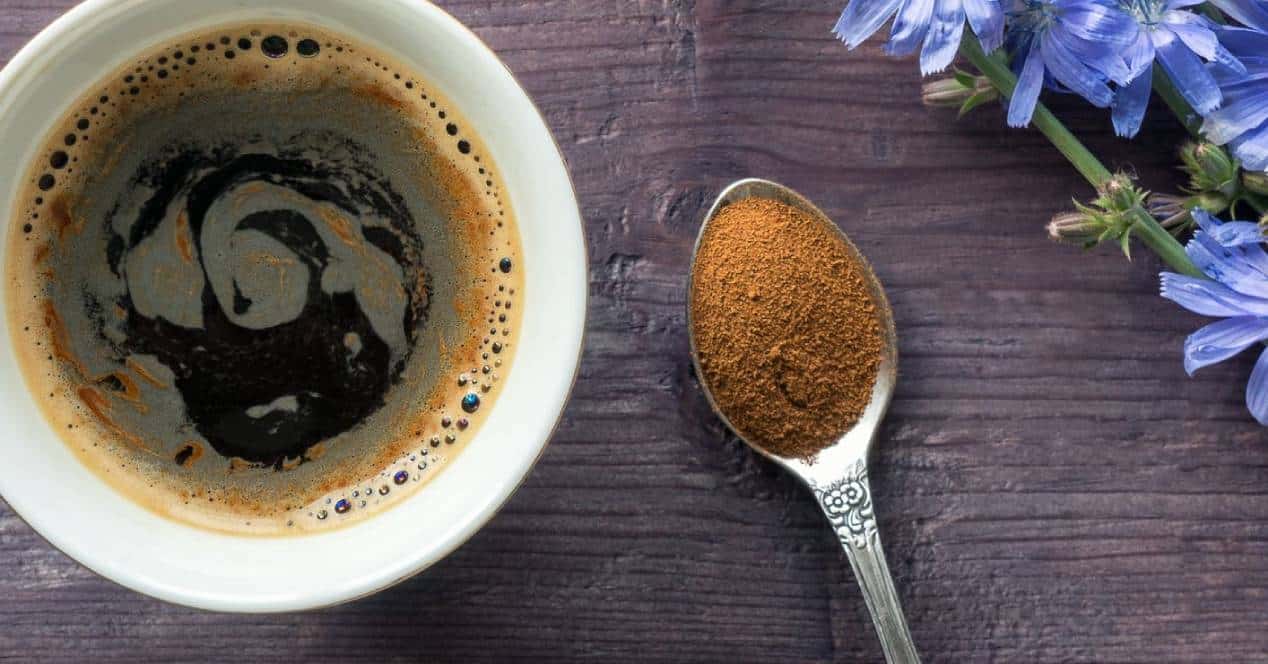
When it comes to what we eat, fiber is often underconsumed in diets. That's why so many of us try to add more fiber to our meals, leading to a lot of interest in high-fiber chicory root. One of the most popular products with this food is chicory coffee.
Chicory is a purple-flowered perennial plant that is a member of the dandelion family with edible leaves and roots, the latter being most often used for culinary purposes, including roasting and grounding for brewing.
Chicory root benefits
Nutritionally, the root is best known for being loaded with a special group of fibers known as fructans. In particular, chicory contains exceptionally high levels of a fructan called inulin, an indigestible soluble fiber. One of the benefits of inulin is that it is considered a prebiotic, which means it can promote the growth of beneficial bacteria (called probiotics) in the gut. This is important, since a better gut health It's linked to everything from boosting immunity, brain function, digestive health, and even body composition.
Another benefit of introducing more inulin into your diet is the potential it has to reduce harmful levels of LDL cholesterol, which makes it indicator friendly. A study in the journal Gut suggests that a change in the composition of bacteria in our intestines caused by inulin consumption may help stools are softer For those who suffer from bowel movement problems.
Some data suggest that inulin supplementation may also help improve performance. blood sugar control. However, this is more likely to occur in people with existing blood sugar control conditions, including type 2 diabetes. Therefore, a diet that is generally high in fiber, abundant in plant foods such as vegetables, fruits, legumes, whole grains, nuts, and seeds will likely offer the same microbiological benefits as chicory root fiber. Other natural sources of inulin include artichokes, asparagus, onions, garlic, and leeks.
Like other edible roots, chicory contains a variety of essential micronutrients including potassium, vitamin C, vitamin B6 and manganese (a nutrient involved in metabolism, immunity and bone formation). But it's unlikely that you'll eat enough radicchio on any given day to get significant amounts of these nutrients.
With regards to football beneficial for bones, research shows that the fiber from the root (approximately 8 grams daily) improves absorption rates. Fiber makes the colon more acidic, which increases the surface area that can absorb nutrients like calcium.
What is chicory coffee?
Chicory is a flowering plant in the dandelion family. It is characterized by a hard, hairy stem, light purple flowers, and leaves that are commonly used in salads. Chicory coffee is made by roasting, grinding, and brewing the roots of the chicory plant. It tastes similar to coffee, with a flavor that is often described as slightly earthy and nutty.
It is used alone or mixed with coffee to complement its flavor. Although the history of chicory coffee is not entirely clear, it is believed that originated in the XNUMXth century in France during the coffee shortage. Looking for a substitute or to lengthen coffee beans, people started mixing chicory root into their coffee to get their coffee fix.
Years later, during the Civil War, it also became popular in New Orleans when the city experienced a coffee shortage after Union naval blockades cut off one of its ports. Today, chicory coffee can still be found in many parts of the world and is often used as a non-caffeine alternative to regular coffee.

Nutritional values
Chicory root is the main ingredient of this coffee. To make it, raw chicory root is ground, roasted, and made into coffee. Although amounts vary, it is generally recommended to use around 2 tablespoons (11 grams) of ground chicory root per 1 cup (237 ml) of water.
One raw chicory root (60 grams) contains the following nutrients:
- Energy: 43 calories
- Protein: 0,8 grams
- Carbohydrates: 10,5 grams
- Fat: 0,1 grams
- Fiber: 1 gram
- Vitamin B6: 9% of the daily value
- Manganese: 6%
- Folate: 4%
- Potassium: 4%
- Vitamin C: 3%
- Phosphorus: 3%
Chicory root is a good source of inulin, a type of prebiotic fiber that can support weight loss and improve gut health. It also contains some manganese and vitamin B6, two nutrients linked to brain health. Note that the amounts of these nutrients in chicory coffee are quite low, as only a small amount of chicory root is infused into the drink.
Services
Chicory coffee has several positive health effects beyond boosting energy.
Improves digestive health
Chicory root is a good source of fiber, which can improve various aspects of digestive health. For example, it can support the health of your gut microbiome, which is believed to be strongly linked to health and disease. This is because chicory root contains inulin fiber, a type of prebiotic that promotes the growth of beneficial bacteria in the intestine.
Several studies have shown that inulin supplementation could increase the concentration of certain strains of healthy bacteria in the colon. Studies also show that chicory can improve bowel function and reduce constipation.
Lowers blood sugar
Chicory root contains inulin, a type of fiber that has been shown to help control blood sugar levels in both human and animal studies. Although research on the effect of chicory inulin on blood sugar is limited, several other studies have shown that it may benefit blood sugar and insulin resistance.
Insulin is the hormone that transports sugar from the blood to the muscles and tissues, where it can be used for fuel. Insulin resistance occurs with prolonged periods of elevated insulin levels that can decrease the effectiveness of insulin and cause high blood sugar levels.
Most studies to date have focused on inulin rather than chicory. More research is needed to determine how chicory coffee, specifically, may influence blood sugar and insulin levels.
Decreases inflammation
Although inflammation is a normal response of the immune system, chronic inflammation is thought to contribute to diseases such as heart disease, type 2 diabetes, and cancer.
Promisingly, some animal studies have found that chicory root may possess anti-inflammatory properties. However, most of the current research on this topic is limited to animal studies. More studies are needed to determine how chicory root may affect inflammation in humans.
does not contain caffeine
Chicory coffee can be a great way to cut back on caffeine. Regular coffee is made from coffee beans that are roasted, ground, and brewed. A typical cup of coffee contains around 92mg of caffeine, although this amount varies depending on factors such as the type of coffee beans used, the serving size, and the type of coffee roast.
Consuming large amounts of caffeine has been associated with side effects such as nausea, anxiety, rapid heartbeat, restlessness, and insomnia. Chicory root is naturally caffeine free, making it an excellent coffee substitute if you want to cut down on caffeine.
Some people add chicory root to hot water for a completely caffeine-free drink, while others mix it with a small amount of regular coffee for a less caffeinated drink.
How to drink chicory coffee?
Yes, you can cook and eat whole chicory root like you would other root vegetables, but its availability is quite limited and it's not something most people roast like carrots and beets. Instead, chicory is typically consumed in beverage form or as chicory root fiber added to packaged foods.
Chicory coffee is made from chicory roots that have been dried, roasted and ground, so it is ready to prepare. Brands of "coffee" and herbal teas, such as Teeccino, which are blended with ground chicory root instead of ground coffee beans, can be a rich-tasting alternative to coffee for those looking to abstain from caffeine. Other ingredients in these beer may include carob and barley.
Another option is to use brands that mix chicory with a small amount of coffee to reduce the amount of caffeine What does it consume if that is your goal? Just keep in mind that chicory coffee generally doesn't contain much inulin fiber, as the grounds leach out of the finished drink. To get the full prebiotic benefit, you'll need to consume the root itself or the fiber in isolation. And since these drinks contain very little or no caffeine, don't expect a steaming chicory coffee drink to supercharge your workouts.
Standalone chicory powder, with its woody and slightly nutty flavor, can be added to soups, sauces, homemade energy bars, chocolate puddings, shakes, and hot beverages such as coffee, tea, and hot chocolate, to increase fiber. The powder is more soluble in water than coffee, which means you have to use much less when brewing it directly as a coffee alternative.
Recipe for chicory coffee
- Start with 1/2 teaspoon of radicchio for every cup of hot water and adjust according to your taste.
- To make a chicory coffee mix, use about 2/3 ground coffee and 1/3 chicory.
When to reduce the consumption of chicory?
As soluble fiber, inulin swells in the stomach when consumed. Although this can help control hunger and, in turn, can aid in weight loss efforts, it can also lead to Stomach problems, including abdominal pain, bloating, and gas in people who are not used to eating inulin or a lot of fiber.
Consume smaller amounts (no more than 5 grams a day) and gradually increasing from there is the best way to build tolerance and wreak digestive havoc. That could mean eating just half of an energy bar that contains high amounts of chicory fiber. Some people just seem to be more sensitive to inulin than others and may need to cut back. Always be sure to drink plenty of water when consuming chicory fiber, or more fiber in general, to help with digestion.
An obvious time when you don't want to go overboard with fiber from foods like radicchio is before going to train. Take an energy bar with 10 grams of inulin added just before you break a sweat, and you could have the worst of your workouts.
All the people allergic to ragweed or pollen should consider avoiding chicory, as it belongs to the same family of plants. and people with irritable bowel syndrome (IBS) may be more likely to experience gastrointestinal side effects when eating plenty of chicory root fiber at one time.
